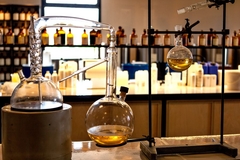
17 Jan 2022 --- Evonik invests in the world’s first production plant of bio-based rhamnolipids, based in Slovakia. Rhamnolipids are biosurfactants that can be used instead of petrochemical ingredients to lift dirt and grease.
Evonik provides bio-based chemical expertise that form the basis of Unilever's biodegradable products. The two companies are collaborating toward a hygienic and sustainable future.
Evonik’s innovation is unique to other biosurfactants because: “Evonik’s rhamnolipids contain no oils as feedstock, they are nature identical,” Dr. Hans Henning Wenk, vice president R&D at Evonik’s Care Solutions business line tells PersonalCareInsights.
Rhamnolipids are key ingredients in cleaning agents like shower gels and detergents as it is foam-producing. Apart from adding to cleaning products, rhamnolipids can be extended for personal care products such as cosmetics as they are gentle on the skin.
“The entire conversion of sugar to rhamnolipids happens in…the pathways of the microbial cell…The bacteria converts part of the sugar to rhamnose (also a special type of sugar, which forms the “hydrophilic” = water loving part of the biosurfactants), another part to certain fatty acids (forming the “hydrophobic” = fat loving part) and in the end couples both parts together to rhamnolipids. Finally the cells export the rhamnolipids to the “fermentation broth”, from which they are later isolated,” explains Hans.
Collaborating for a cleaner future
The demand for sustainable surfactants is rising globally, observes Unilever. Bert Nijhous, head of research and development at Unilever says: “People are increasingly concerned that their cleaning products may have a negative impact on the environment.”
As a result, Unilever launched Quix in Chile and Vietnam – a dishwashing liquid made in collaboration with Evonik’s rhamnolipids. Evonik is one of many leaders specializing in chemicals with its R&D investments.
Evonik is one of many leaders specializing in chemicals with its R&D investments.
Nijhous adds that consumers care for the environment but do not compromise on performance.
Hans predicts that biodegradable alternatives will become mainstream in the future and actions are already being taken: “for home and personal care ingredients, this is a clear yes.”
Environmentally friendly surfactants are growing rapidly worldwide. This “is based on several market reports as well as customer feedback and commitment, for example Unilever’s clean future initiative (no virgin petrochemicals until 2030 in home care),” adds Hans.
Unilever’s Clean Future initiative is to “replace fossil carbon in all cleaning products by 2030” and to make products “biodegradable by 2030, to protect water resources.”
Additionally, Unilever adds that “by partnering with businesses who are leading experts in their respective fields, we have introduced new science and technologies to reduce or replace everything from plastics to carbon.”
Earlier this month, Unilever also teamed up with Holobiome, although this was to research specific food ingredients that interact with key gut bacteria.
Why choose rhamnolipids
Evonik’s expertise in chemicals, especially rhamnolipids, allows Unilever to produce biodegradable products and reach its 2030 goals.
In turn, Unilever allows Evonik to expand its market position to promote the growth of biosurfactants.
Additionally, Evonik’s acquisition of Botanica shows Evonik’s turn toward producing sustainable ingredients.
Bio-based rhamnolipids play a role in the clean initiative by making “sustainability easy for everyone,” argues Peter Dekkers, executive vice president middle Europe, Unilever.
Rhamnolipids do not compromise on “performance or affordability,” adds Peter. So, this implies that there is little reason for continuing the use of fossil carbon or tropical fats used as mainstream surfactants.  Evonik’s purpose is to improve life, today and tomorrow.
Evonik’s purpose is to improve life, today and tomorrow.
Investing in biotechnology research
Harald Schwager, Evonik’s chief innovation officer, states that the company “invests more than €400 million (US$ 456 million) a year” for research and development.
Evonik also says that the demand for “hygiene and cleanliness is increasing” and so, hand dishwashing detergents are in demand, especially in less industrialized countries. Moreover, since wastewater is not intensively treated, a completely degradable ingredient is an advantage, adds Evonik.
The partnership between Evonik and Unilever began in 2019. Evonik’s production plant is planned to be launched within two years.
Hans tells PersonalCareInsights, “Evonik and Unilever have partnered very successfully to bring this amazing technology from the lab to commercial reality in home care and will continue to drive innovation to improve sustainability of the category.”
By Venya Patel













